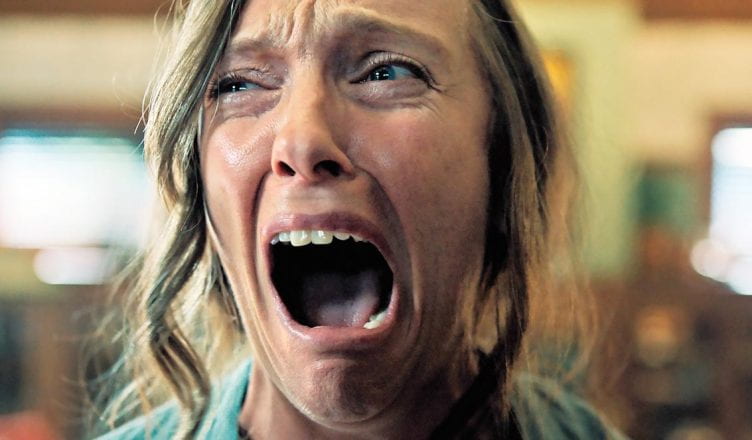Film Deets:
Director: Ari Aster
Screenplay: Ari Aster
Actresses: Toni Collette
Category: Maternal Grief
Themes: Grief, Family Trauma
Why do these screams matter?
Maternal grief butts up against maternal alienation in Ari Aster’s Hereditary (2019) and underscores how familial trauma can be replicated in the mother-child relationship. In the film, Annie (Toni Collette) has just lost her mother, a woman with whom she had a fraught and complicated relationship. As she navigates that grief journey, her world is upended again when an unimaginable loss further fractures the family. As Vox’s review points out, Hereditary “portrays the genuine antipathy that can spring up between family members in the wake of grief” and it is against this backdrop that the film explores maternal loss (Wilkinson).

The film opens with a panning shot of an artist’s studio populated with miniature replicas depicting scenes of domesticity and then moves to a tight bedroom shot ushering the audience into the filmwhere the Graham family is preparing for the funeral of the maternal grandmother, Ellen Leigh (Kathleen Chalfant). Annie’s grief is obvious but restrained and her eulogy in which she talks about the complicated relationship she shared with her mother suggests that Annie is processing both the immediate loss of her mother and Annie’s entire history with her. The reveal that the miniatures Annie creates, aptly named “Small World,” are replications of her home and past experiences further demonstrates the gulf that existed between mother and daughter. As Aviva Briefel notes in her consideration of the film’s use of dioramas to heighten the narrative dread, the construction of the dioramas, many of which depict Annie’s relationship with her mother, offers Annie “the ability to gaze down at her mother in a temporary fantasy of dominance (320). And yet, Annie’s grief and unexpressed anger at her mother never breach into non-normative territory. It is culturally accepted that a mother will precede her child in death and that death will make it impossible to find closure for certain relationships. Annie’s grief is quiet and channeled into noiseless art such that her struggles with processing her mother’s death don’t require community or familial intervention. This grief response is then contrasted against Annie’s grief response for her child that deviates from the status quo.
In our first clip, Peter (Alex Wolff) has returned home from a party shell shocked that an accident has resulted in the decapitation of his younger sister, Charlie (Milly Shapiro). Unable to process the tragedy, Peter leaves Charlie’s body in the backseat of the car and walks catatonically back to his bedroom. As evening turns to morning, we hear Annie awake and begin her morning routine; a routine interrupted by a horrific discovery.
This moment is an emotionally complex one in which Annie, held by her stoic husband, rocks back and forth as she screams. The movement is primal and echoes the process of birth suggesting that Annie is “birthing” a primordial grief so guttural that it fills the space left by her daughter. The co-mingling of grief and shock works to frame Annie’s emotional response as sympathetic. But it is also culturally coded to imply a specific type of instability. Annie’s screams in this scene slowly escalate into a crescendo of grief that contrasts with Peter’s shock-fueled emotionlessness. This hysterical versus stoic response dichotomy is a complicated one since the responses are both authentically organic while also being problematically gendered. Certainly, the loss of a child coupled with the grotesqueness of the state of Charlie’s body is enough to incite Annie’s hysterical response. But when compared against the restrained grief of her husband and the dispassionate reaction of her son, Annie becomes the overwrought woman who can’t control her emotions. Because hysteria was the first mental illness to be associated with women exclusively, it is a label that carries with it a specific set of audience expectations (Tasca et al.). “Hysterical” becomes a type of cultural shorthand that positions women as unstable. This implied instability is then leveraged in the film to frame Annie as a potentially unreliable narrator, which greatly colors her subsequent interactions with her son, and to move her grief from sympathetic to monstrous.
Our second scream takes place while Annie, Peter, and Steve (Gabriel Byrne) sit in relative silence at the family dining room table. The only sounds audible are from the cutlery as Peter and Steve eat and Annie moves her food around her plate. But silence soon turns to rage as long-simmering tensions between Annie and Peter finally erupt.
 Here, Annie’s grief is turned outward as her screams at Peter crescendo into anger fueled recriminations that suggest Peter is responsible for Charlie’s death. As Annie’s only living child, Peter is one of the two people closest to Annie. That she would feel comfortable enough to lash out at him while in a grief state is not unique. Indeed, many bereaved parents “may act out, be angry and rage at those closest to them” (Yoder 473). But Annie’s response is not an isolated moment but an escalation of her already-existing frigidity toward Peter. Her appearance during this moment vacillates between controlled and hysterical and reads as a verbal assault fueled by what she perceives as Peter’s indifference to Charlie’s death. The undercurrent of rage in Annie’s unrelenting torrent of words moves the audience’s sympathy away from her and toward Peter and reflects Alyson M. Davies’ contention that “parents who are bereaved of their adolescent child are more at risk of disturbed grief reactions, especially the development of pathological grieving” (1332). This moment cements for viewers that Annie’s maternal grief has become compulsive and damaging to those around her such that her ability to parent Peter is now in question. And yet, Annie never becomes the monster because we understand that a large part of her emotional reaction is tied up in her own complicated feelings about her mother.
Here, Annie’s grief is turned outward as her screams at Peter crescendo into anger fueled recriminations that suggest Peter is responsible for Charlie’s death. As Annie’s only living child, Peter is one of the two people closest to Annie. That she would feel comfortable enough to lash out at him while in a grief state is not unique. Indeed, many bereaved parents “may act out, be angry and rage at those closest to them” (Yoder 473). But Annie’s response is not an isolated moment but an escalation of her already-existing frigidity toward Peter. Her appearance during this moment vacillates between controlled and hysterical and reads as a verbal assault fueled by what she perceives as Peter’s indifference to Charlie’s death. The undercurrent of rage in Annie’s unrelenting torrent of words moves the audience’s sympathy away from her and toward Peter and reflects Alyson M. Davies’ contention that “parents who are bereaved of their adolescent child are more at risk of disturbed grief reactions, especially the development of pathological grieving” (1332). This moment cements for viewers that Annie’s maternal grief has become compulsive and damaging to those around her such that her ability to parent Peter is now in question. And yet, Annie never becomes the monster because we understand that a large part of her emotional reaction is tied up in her own complicated feelings about her mother.
The idea that a “good mother” would never scream at her child gets radically upended in this scene and demonstrates the profound impact a legacy of family trauma can have on interpersonal familial relationships. According to the Spring 2019 Stanford Medicine Bulletin, “Dr. Rachel Yehuda, a neuroscientist at the Mount Sinai School of Medicine, offered an intriguing new idea: that children of traumatized parents are at risk for similar problems because of epigenetic changes that occurred in the biology of their traumatized parents.” (A Legacy of Trauma). In other words, generational trauma may fundamentally change people at a cellular level such that the trauma can be passed down to future generations. For Annie, whose own difficult relationship with her mother expresses itself in behaviors consistent with post-traumatic stress disorder, her rage is both a by-product of her anger at Peter for his actions and at her mother for failing to provide the stable upbringing for which Annie yearned. Her screams at Peter are an expression of the cyclical trauma that has followed her from childhood into adulthood and further positions her rage as hysterical, especially when contrasted against Peter’s caustic but controlled retorts.
That Annie is ultimately proven correct in her suspicions at the film’s conclusion are of little consequence because her family – and the audience by extension – have already dismissed her warnings as the rantings of an unstable woman consumed by grief. It is a profound indictment of the ease by which women can be marginalized for daring to be emotional.
Works Cited
“A Legacy of Trauma.” Stanford Medicine Bulletin, Spring 2019, n.d.
Briefel, Aviva. “The Terror of Very Small Worlds: Hereditary and the Miniature Scales of Horror.” Discourse, vol. 44, no. 3, 2022, pp. 314-327.
Davies, Alyson Mary. “Death of Adolescents: Parental Grief and Coping Strategies.” British Journal of Nursing, vol. 10, no. 20, 2001, pp. 1332-1342.
Hereditary. Directed by Ari Aster, performances by Toni Collette, Milly Shapiro, and Ann Dowd, A24, 2018.
Tasca, Cecilia et al. “Women and Hysteria in the History of Mental Health.” Clinical Practice and Epidemiology in Mental Health, vol. 8, 2012, pp. 110-119.
Yoder, Lynn. “Comfort and Consolation: A Nursing Perspective on Parental Bereavement.” Pediatric Nursing, vol. 20, No. 5, 1994, pp. 473-477.






